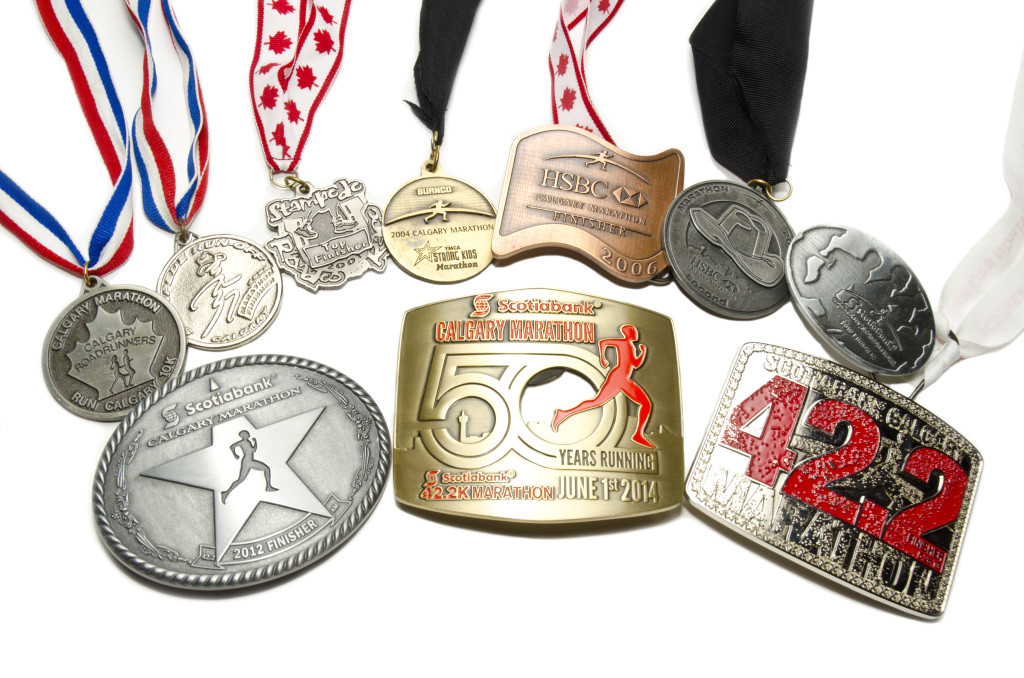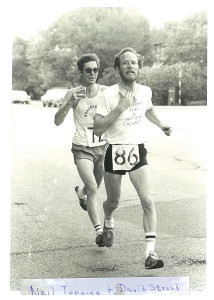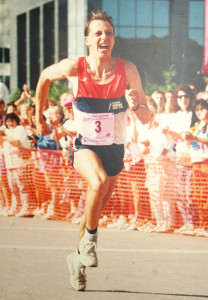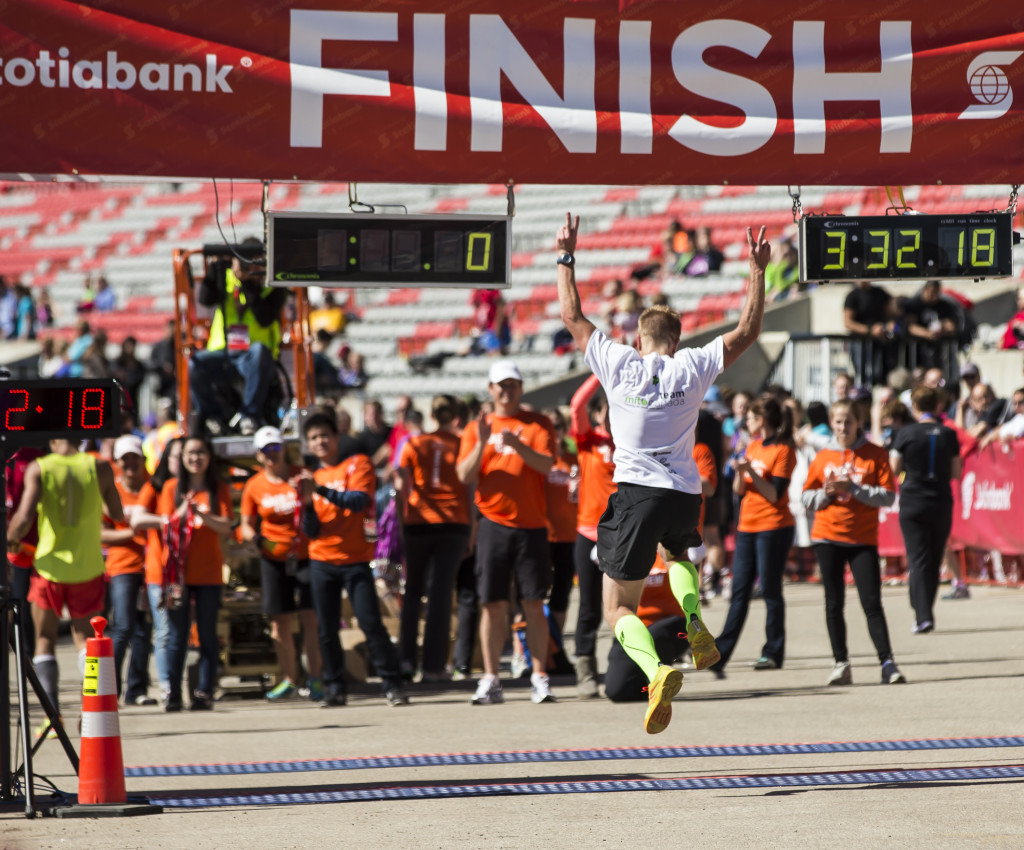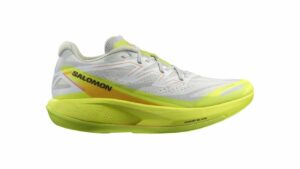50 Years of the Calgary Marathon
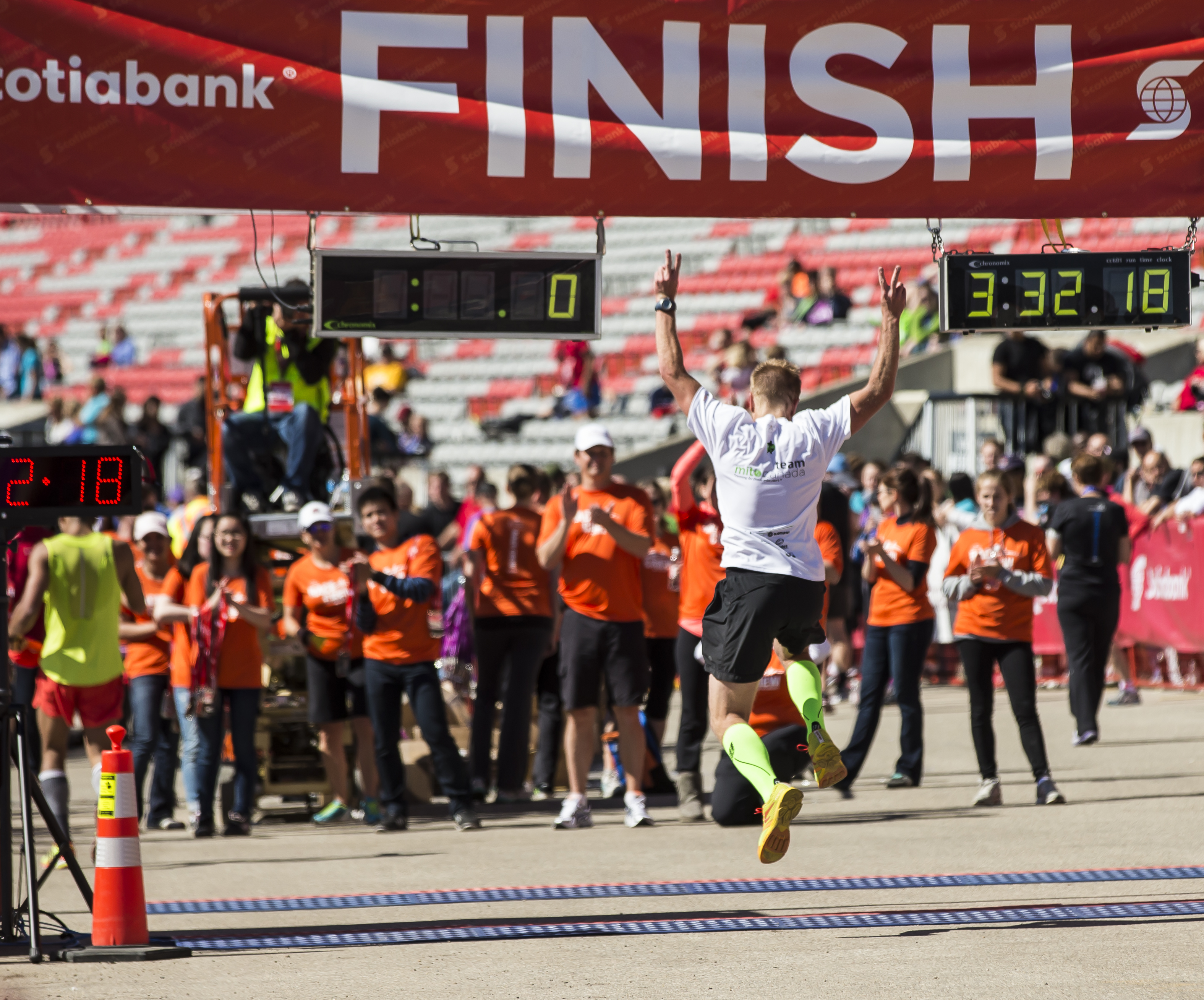
An Olympic Dream Turns Into a Canadian Tradition
By Joanne Elves
It was 1964 and I was four years old, sitting on a curb along the side of a busy road. I remember how hot it was that morning. The power lines above me buzzed. I bored sitting by the side of the road with my mother standing over me and my two brothers, waiting. I remember drawing circles in the silt at my feet.
Suddenly, my mom yells, “Get up! Get up! Here they come!”
On command, my brothers and I leapt to our feet and started cheering, “Go Uncle Gordy! Go!”
A pack of five gaunt, sweating men in singlets and short shorts ran past us. My uncle was tucked in the pack, but he didn’t wave to us. He didn’t even look up to acknowledge us as they marched past. I remember feeling annoyed at his lack of response. That annoyance turned into complete disgust when, after winning the race, on the ride home, my uncle Gordy became violently ill and took my hat and began uncontrollably vomiting into my hat that I’d left in my grandfather’s car. As a four year old, I didn’t care that my uncle was the winner of the Calgary Marathon, or that he was the Canadian marathon champion or an Olympian. All I could think about was that Uncle Gordy barfed in my hat.
The Calgary Marathon is celebrating the 50th running on June 1, 2014. In the half century since that hot summer day in 1964, the race has had some hiccups along the way. It missed a few years and doubled up races in others. It’s seen some great personalities cross the finish line and, like many other races that have weathered the rise and fall in the popularity of the marathon, it has suffered through some financially dark years. Now half a century old, the Calgary Marathon is regarded as a great community event and one of the most important marathons in the country. And it all started with one man trying to get into the Olympics.
The Calgary Marathon got its start in 1963 when a local runner named Doug Kyle thought if they hosted a marathon that year, then Calgary would be a shoe-in to host the Canadian Championships and Olympic trials in 1964. On a cloudy August day, 19 men paid the one dollar entry fee to toe the dusty line on an out-and-back route alongside the traffic on a busy Calgary street. Kyle won in 2:45:54 and won his bid to host the championships the following year. He was also confident the home course advantage would work in his favour. His Olympic dream was becoming a reality. Or so he thought.
The course changed to be faster and flatter in 1964 and a field of 24 Olympic hopefuls lined up in the searing afternoon heat of July. Bill Wyllie, the race director remembers it well: “We followed the Olympic Committee rules very closely. We even found a doctor to check the runners before the race. The funny thing is, he was going to disqualify the top athletes before the race even started,” says Wyllie. “He obviously didn’t know anything about long distance runners. He said their pulse rate was too low.”
My uncle, Gord Dickson of Burlington Ont., went on to win the marathon in 2:39:55 and Kyle finished third. As Dickson recalls, “It was held in the middle of a very hot and dry day. Most of us came to Calgary from lower elevations and higher humidity so the odds were stacked against us. Everyone’s time was way off. So, when it came to selecting the team for the Tokyo Olympics, no marathoners were named to represent Canada.”
The race disappeared for three years but Neil Topper remembers the 1968 race quite well. “They started the race around 5:00 p.m. and within a few miles, I lost sight of the other 27 runners. Back then anyone in these races was a serious runner finishing sub three hours. So when Andy Boychuk won the race in 2:29:21 it didn’t take long for the rest of the pack to finish. By the time I entered Mewata Stadium, everyone was gone. The officials were gone, the lights were off, and the place was shut down. Bill Wyllie let me know I finished roughly at 4:09,” says Topper with a laugh. “There was a big windup party at the Calgary Inn and I guess they all wanted to get to the party. I had to walk over and enjoy the event still dressed in my running clothes.”
Topper continued to compete 11 more times in the Calgary Marathon, dropping his Calgary marathon finish time to 2:44. He says his favourite route was in the early 1970’s when it did laps of the heavily wooded Bowness Park where family and friends could see the runners most of the time.
The 1970’s saw a few Calgary Marathons held in single years as the running boom took off. Women were finally welcomed to enter marathons and people who had no intention of actually winning the event were lining up with the elite.
In 1975, the first recorded female to finish was recorded when Carmen Robinson of Banff won the women’s race in 3:50:12. The second place woman, Cathy Broderick, came in forty minutes later. Before the decade was done, Linda Currie cracked the three-hour barrier and finished in 1979 with 2:44:31.
The 1980s
The race settled on May, although the weather in Calgary is highly unpredictable in late spring. The 1980 race was blanketed by a freezing rain storm. As Rob Reid crossed the finish line in 2:31:29, wearing everything he could find to stay warm – including a toque on his head and socks on his hands – a local newspaper reporter came up to congratulate him. Reid turned to him and said, “Don’t talk to me. I was just trying to get out of this weather. The real story is those people still out there.” Reid went on to win the Calgary race four times during the 1980s, setting a course record of 2:26:37 in 1981.
Lorna Hawley won five times during the 1980s, stating once, “I wasn’t there to win, there just weren’t many women at races back then.” Her best time in Calgary was 2:54:45 in 1984 and was the course record until 1989 when Lisa MacBeth came in at 2:51:26. A year later Claire Kroshus, unintentionally set the course record for women of 2:45:59. “I didn’t train specifically,” Kroshus says. “I was actually injured beforehand and my longest run was about two-and-a-half hours. I went out slow and felt pretty good so I picked it up with 10K to go.”
The 1990s
The 90s ushered in the Kelvin Broad era. Even Rob Reid, who has now been the race director for the Victoria Marathon for over 20 years, is in awe of Broads’s accomplishments. “Kelvin is amazing. If we could look at the records of all the marathon winners in Canada, he’d be at the top with eight wins in Calgary and five in Victoria.”
Broad had tried the marathon distance in his homeland of New Zealand in 1983 and had only been in Calgary ten months when he entered the marathon in 1991. “I lead the race from start to finish with the chase group joining me at about 16K,” Broad says. “They tried to slow the pace down which I was having nothing of, so I increased the pace again and that is the last I saw of them. My partner Angie told me at about 3K to go that I had a chance of breaking the race record and that spurred me on to a strong finish. Despite 15 or so years of running I had never finished a race – let alone won a race – in front of a crowd like the one that greeted me when I broke the tape.”
Broad went on to win the race seven more times while working on a Ph.D. at the University of Calgary. He even took on the roll, with Angie Driscoll, as race director in 1999 when debt was about to sink the race. “Every time I won the race it was an emotional thrill,” Broad says. “But more important was our time as race directors. After some tough times we managed to obtain some key sponsorship from the federal government and local businesses that allowed us to bring the race back on a sound financial footing. That first run in Calgary had served to cement a relationship with the race that we maintained throughout our time in Calgary.”
Broad and Driscoll now reside in Scotland. He’s still running, but his new chase pack includes eight sheepdogs that he trains for herding competitions.
When Broad stopped competing, Dennis Colburn of Edmonton became the perennial winner taking the title four times. The new millennium brought more runners, venue changes, name and sponsor changes and a shift from the July date. Having the race coincide with the Calgary Stampede was great for tourism, but busy roads, heat and a shortage of portable toilets shifted the race in 2009 to the last weekend of May or early June permanently.
Tammy and Rob Stichbury have been in charge of making the changes since the mid-1990s as volunteers in charge of the venue. “The race is a big part of our lives,” says Tammy. “Rob is always thinking up ways to improve the layout.”
Stichbury says the runners are really never the issue that causes them to laugh or curse. It’s the weather or unexpected guests that stand out as her favourite stories. A few years ago, the Westin Hotel was a sponsor and had a mock hotel room constructed at the finish area at Mewata Stadium. A 24-hour security detail always surrounds the food tents during race weekend, but no one thought to watch the tent with the fake hotel room.
“When we got there at 4:30 a.m. and opened all the tents we found someone actually sleeping in the hotel room bed.” laughs Stichbury. “I felt 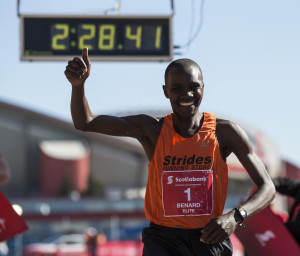 bad but he did have to go.”
bad but he did have to go.”
Every year the weather is always the biggest question mark. “We’ve had everything from snow to a heatwave, and sometimes all within the same race,” Stichbury laughs. “In 2005, there was frost on the ground in the morning. When the runners were standing on the start line a searing heat crept in. Anyone on the course after the 3:30 mark was pelted by a massive hail storm, but they kept crossing the finish line. And that was a July race.”
In May of 2012, after 21 years, Broad’s record was broken by just over a minute when Bernard Onsare. The Kenyan-born distance runner who has become a fixture on the Canadian running scene in recent years won again last year with a 2:28:52 finish. Like many Kenyan runners, Onsare came to Canada to win a few races and secure a better future for himself and his family. What’s interesting is that when Onsare came to Canada; his mentor in Ontario was Gord Dickson.
